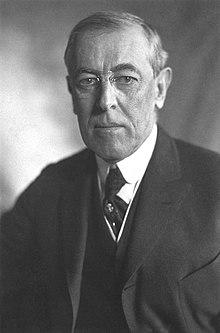This year is the Centennial of the signing of the Treaty of Versailles. Signed on 28 June 1919 in the Hall of Mirrors at Versailles Palace, the Treaty was the most important of the peace treaties that brought an end to World War I. To mark this anniversary, the Peace Palace Library has put together a collection of books exploring the background and aftermath of the Versailles Treaty. Part IV: Wilson's Fourteen Points.
The Fourteen Points were a statement of principles for peace that was to be used for peace negotiations in order to end World War I. The principles were outlined in a January 8, 1918, speech on war aims and peace terms to the United States Congress by President Woodrow Wilson.
The United States had joined the Allied Powers in fighting the Central Powers on April 6, 1917. Its entry into the war had in part been due to Germany's resumption of submarine warfare against merchant ships trading with France and Britain and also the interception of the Zimmermann Telegram. However, Wilson wanted to avoid the United States' involvement in the long-standing European tensions between the great powers; if America was going to fight, he wanted to try to separate that participation in the war from nationalistic disputes or ambitions. The need for moral aims was made more important, when after the fall of the Russian government, the Bolsheviks disclosed secret treaties made between the Allies.
The speech made by Wilson took many domestic progressive ideas and translated them into foreign policy: free trade, open agreements, democracy and self-determination. Three days earlier UK Prime Minister Lloyd George had made a speech setting out Britain's war aims which bore some similarity to Wilson's speech but which proposed reparations be paid by the Central Powers and which was more vague in its promises to the non-Turkish subjects of the Ottoman Empire. The Fourteen Points in the speech were based on the research of the Inquiry, a team of about 150 advisers led by foreign-policy adviser Edward M. House, into the topics likely to arise in the anticipated peace conference.
Wilson's Fourteen Points had helped win the hearts and minds of many as the war ended; these included Americans and Europeans generally, as well as Germany, its allies and the former subjects of the Ottoman Empire specifically. Wilson felt it was his duty and obligation to the people of the world to be a prominent figure at the peace negotiations. High hopes and expectations were placed on him to deliver what he had promised for the post-war era. In doing so, Wilson ultimately began to lead the foreign policy of the United States toward interventionism, a move strongly resisted in some domestic circles.
But his main Allied colleagues - Georges Clemenceau of France, David Lloyd George of the United Kingdom, and Vittorio Orlando of Italy - were skeptical of the applicability of Wilsonian idealism. France and Britain tried to appease the American President by consenting to the establishment of his League of Nations. However, because isolationist sentiment was strong and some of the articles in the League's charter conflicted with the United States Constitution, the United States never ratified the Treaty of Versailles nor joined the League of Nations, which President Wilson had helped create, to further peace through diplomacy rather than war and conditions which can breed it. Under President Warren Harding the United States signed separate treaties with Germany, Austria, and Hungary in 1921.
United States of America, Versailles and Books
- Ferguson, N., The War of the World: Twentieth Century Conflict and the Decline of the West, New York, Penguin Press, 2006.
- Grosclaude, E., Le président Wilson: conférence donnée à Versailles au Bosquet d'Apollon, le 8 septembre 1918, par le Comité "L'Effort de la France et de ses alliés, Paris, Bloud et Gay, 1918.
- Heckscher, A., Woodrow Wilson: A Biography, New York, Scribner's (Macmillan), 1992.
- Kennedy, R.A., A Companion to Woodrow Wilson, Chichester, Malden, MA, Wiley-Blackwell, 2013.
- Noble, G.B., Policies and Opinions at Paris, 1919: Wilsonian Diplomacy the Versailles Peace and French Public Opinion, New York, The Mamillan Company, 1935.
- Snell, J.L., "Wilson on Germany and the Fourteen Points", in: 26 Journal of Modern History (1954), No. 4, pp. 364–369. [Not available in PPL collection]
- Tilman, S.P., Anglo-American Relations at the Paris Peace Conference of 1919, Princeton, NJ, Princeton University Press, 1961.
- Walworth, A.C., Wilson and His Peacemakers: American Diplomacy at the Paris Peace Conference, 1919, New York, Norton, 1986.
Treaty of Versailles Centennial
The Treaty of Versailles was the most important of the peace treaties that brought World War I to an end. The Treaty ended the state of war between Germany and the Allied Powers. It was signed exactly five years after the assassination of Archduke Franz Ferdinand, which had directly led to the war. The other Central Powers on the German side signed separate treaties. Although the Armistice, signed on 11 November 1918, ended the actual fighting, it took six months of Allied negotiations at the Paris Peace Conference to conclude the peace treaty. The treaty was registered by the Secretariat of the League of Nations on 21 October 1919.
